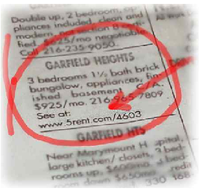It also pays to work with other local people in the same business and send surplus guests to competitors (they will usually reciprocate). It isn’t necessary to just market locally or stick to your home country; you can extend your marketing abroad.
Publications

There’s a wide range of French and foreign newspapers and magazines in which you can advertise, e.g. Daltons Weekly and newspapers such as the Sunday Times in the UK. You will need to experiment to find the best publications and days of the week or months to advertise. These magazines also publish articles by property owners, usually free (they may even pay you!).
There are also companies that produce directories of properties let directly by owners such as Private Villas (UK 020-7955 3760, http://www.privatevillas.co.uk), part of Daltons Weekly, in the UK. You pay for the advertisement but handle bookings yourself. Advertisements must be placed by September for publication in November.
Other companies, such as Brittany Ferries and Crystal Holidays, publish holiday rental brochures (also in the autumn) and will advertise your property, although they may handle the bookings, on which they take a commission.
Internet
Advertising on the internet is an increasingly popular option for property owners. There are two options: place an advertisement on an agent’s site – e.g. Chez Nous (UK 0870-197 1000, http://www.cheznous.com ), France One Call (UK
0871-717 9091 or France 05 53 90 49 76, http://www.franceonecall.com ), French Connections (http://www.frenchconnections.co.uk ), Guide Vacances (http://www.guidevacances.com ), Homelidays ( 01 47 70 08 15, http://www.homelidays.com ), Vacation Rentals by Owner/VRBO ( http://www.vrbo.com ) and Visit France (UK 0870-350 2808, http://www.visitfrance.co.uk ) – which will cost you between around €120 and 150 per year, or set up your own site.
Although more expensive to set up, a personalised website is virtually free thereafter and can include photographs, brochures, booking forms and maps of the area, as well as comprehensive information about your property. You can also provide information about flights, ferries, car rental, local attractions, sports facilities and links to other useful websites. A good website should be easy to navigate (don’t include complicated page links or indexes) and must include contact details, preferably via e-mail.
Brochures & Leaflets
It’s wise to produce a coloured brochure or leaflet containing the following:
- External/internal pictures (or a single colour brochure with coloured photographs glued to it, although this doesn’t look so professional).
- Important details.
- The exact location.
- Local attractions and details of how to get there (with a small map).
- The name, address and telephone number of your caretaker or letting agent.
It’s necessary to make a home look as attractive as possible in a brochure without distorting the facts or misrepresentation (you can be fined heavily for this in France). Advertise honestly and don’t over-sell your property. Many people return to the same property each year and you should do an annual mail-shot to previous clients and send them some brochures. Word-of-mouth advertising is the cheapest and always the best.
Handling Enquiries
If you plan to let a home yourself, you will need to be equipped with a mobile phone or an answerphone and a fax machine, as well as internet connection. You must decide how to handle enquiries about flights and car rentals; it’s easier to let clients make their own bookings, but you should be able to offer advice and put them in touch with airlines, ferry companies, travel agents and car rental companies. You should enclose a stamped addressed envelope when sending out leaflets. Finally, keep detailed records and ensure that you never double book!
Information Packs
You should also provide information packs for clients who have booked: one to be sent to them before they leave home and another for them to use when they arrive.
After accepting a booking, you should provide guests with a pre-arrival information pack containing the following:
- Information about local attractions and the local area (available free from tourist offices).
- A map of the local area and instructions how to find the property.
- Emergency contact numbers in your home country (e.g. the UK) and France if guests have any problems or plan to arrive late.
- The keys or instructions on where to collect them on arrival.
Post-arrival
It’s an advantage if you can arrange for someone to be on hand to welcome your guests when they arrive, explain how things work, and deal with any special requests or minor problems. You should also provide an information pack in your home for guests explaining the following:
- How things work, e.g. kitchen appliances, TV/video, heating and air-conditioning.
- Security measures.
- What not to do and possible dangers (for example, if you allow young children and pets, you should make a point of emphasising dangers such as falling into the pool).
- Local emergency numbers and health services such as a doctor, dentist and hospital/clinic.
- Emergency assistance such as a general repairman, plumber, electrician and pool maintenance (you may prefer to leave the telephone number of a local caretaker who can handle any problems).
- Recommended shops, restaurants and attractions.
Many people provide a visitor’s book, in which guests can write their comments and recommendations regarding local restaurants and attractions, etc. Some owners also send out questionnaires.
This article is an extract from Buying a home in France. Click here to get a copy now.

